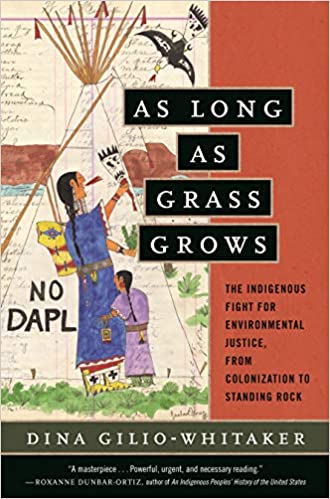Beacon Press
As Long as Grass Grows: The Indigenous Fight for Environmental Justice, from Colonization to Standing Rock by Dina Gilio-Whitaker (Paperback)
As Long as Grass Grows: The Indigenous Fight for Environmental Justice, from Colonization to Standing Rock by Dina Gilio-Whitaker (Paperback)
Couldn't load pickup availability
Nonfiction - History - Indigenous Peoples of the Americas - Environmental Conservation and Protection
RELEASE DATE: 3/31/2020
The story of Native peoples’ resistance to environmental injustice and land incursions, and a call for environmentalists to learn from the Indigenous community’s rich history of activism
Through the unique lens of “Indigenized environmental justice,” Indigenous researcher and activist Dina Gilio-Whitaker explores the fraught history of treaty violations, struggles for food and water security, and protection of sacred sites, while highlighting the important leadership of Indigenous women in this centuries-long struggle. As Long As Grass Grows gives readers an accessible history of Indigenous resistance to government and corporate incursions on their lands and offers new approaches to environmental justice activism and policy.
Throughout 2016, the Standing Rock protest put a national spotlight on Indigenous activists, but it also underscored how little Americans know about the longtime historical tensions between Native peoples and the mainstream environmental movement. Ultimately, she argues, modern environmentalists must look to the history of Indigenous resistance for wisdom and inspiration in our common fight for a just and sustainable future.
Author Bio:
Dina Gilio-Whitaker (Colville Confederated Tribes) is the policy director and a senior research associate at the Center for World Indigenous Studies and teaches American Indian Studies at California State University San Marcos. She is the coauthor, with Roxanne Dunbar-Ortiz, of "All the Real Indians Died Off" and 20 Other Myths About Native Americans. She lives in San Clemente, California.
“Highly recommended for American Indian studies and environmental justice students and scholars.”
—Library Journal
“Gilio-Whitaker takes the reader on a historical journey that, had it been penned about the Jewish Holocaust or the ‘ethnic cleansing’ conducted at the behest of any number of twentieth-century despots, would be well known. Yet when it comes to the United States’s continuing campaign to wipe tribal communities from the map, most Americans are in a state of denial that such a thing could happen.”
—Los Angeles Review of Books
“An important and accessible work recommended for students and scholars of political ecology from the undergraduate level up. Gilio-Whitaker’s far-reaching work creates a compelling foundation upon which to add specific examples of the ongoing struggle for environmental justice and Indigenous rights during times of anthropogenic climate change. By connecting Native American history with the environmental justice movement in a clear and comprehensive manner, Gilio-Whitaker clarifies the depth of the wrong-doings of the past, while also opening the door to a wide range of opportunities for positive change in the future.”
—Journal of Political Ecology


